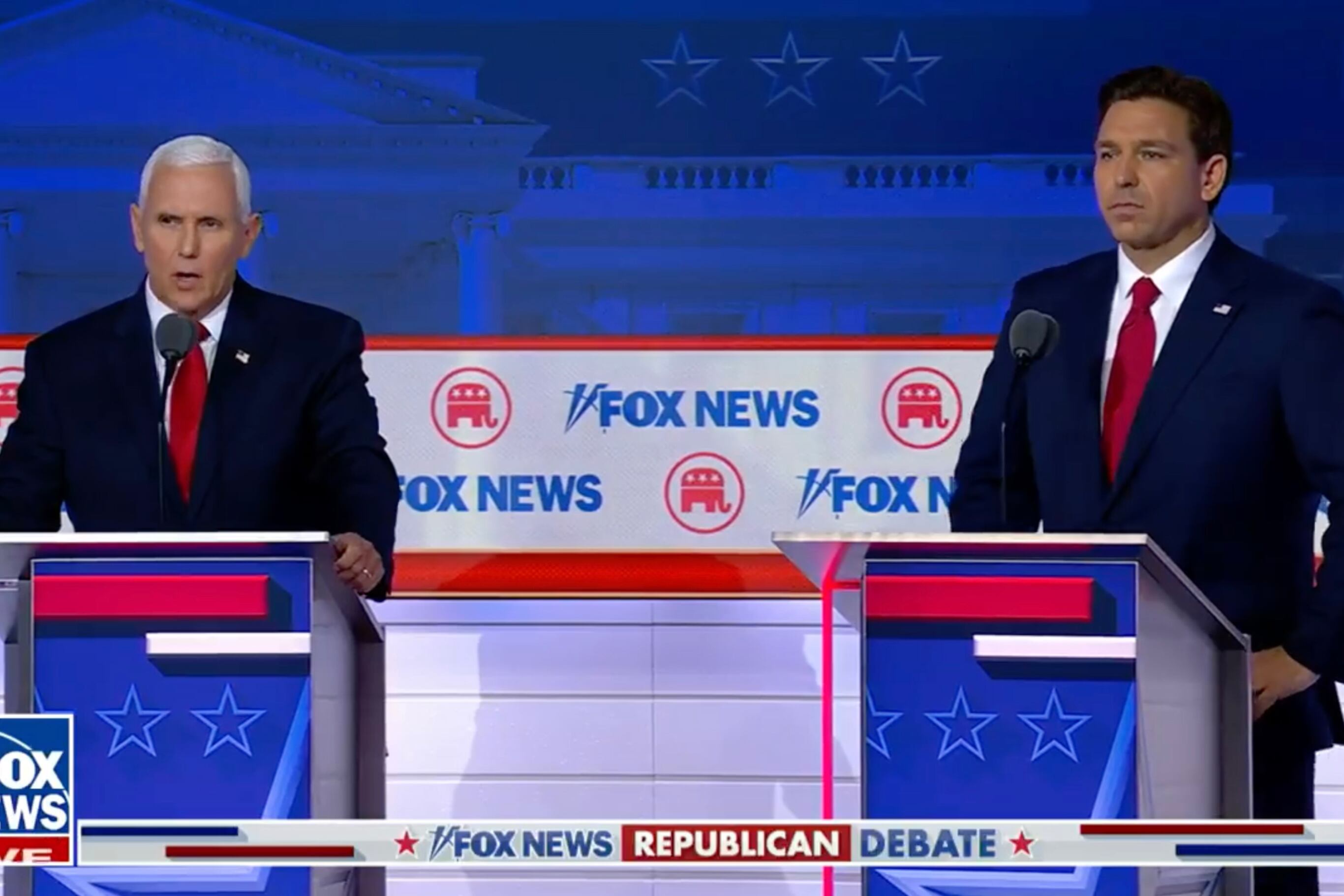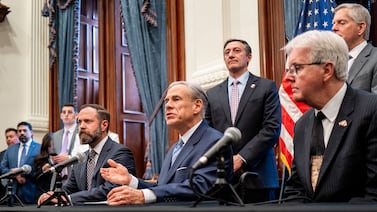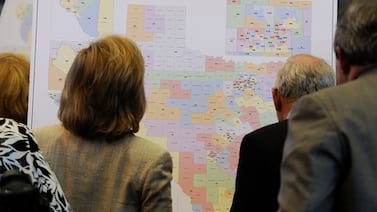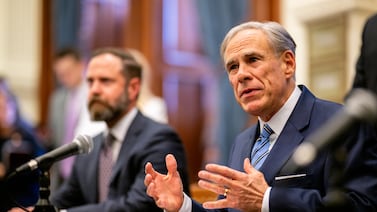Votebeat is a nonprofit news organization reporting on voting access and election administration across the U.S. Sign up for our free newsletters here. A version of this post was originally distributed in Votebeat’s free weekly newsletter. Sign up to get it delivered to your inbox every Saturday.
Hi, y’all,
The first Republican primary debate, as expected, was really awkward. Former President Donald Trump was not in the room but also very much in the room. Even while it appeared the eight presidential candidates standing on the stage might actually succeed in ignoring Trump’s effort to overturn the 2020 election until the last half of the debate.
They certainly tried. Asked if former Vice President Mike Pence did the right thing that day by ignoring Trump’s demands to reject electoral votes cast for Joe Biden, Florida Gov. Ron DeSantis danced around the question until Pence himself forced an answer. “Mike did his duty,” said DeSantis. “I got no beef with him.”
Slow clap for DeSantis, whose team apparently did not prepare him to answer perhaps the most obvious question any Republican candidate could possibly have been asked in the first debate. He’d only just acknowledged Trump’s loss two weeks prior to the debate, so it sort of boggles the mind he wasn’t more prepared for this.
But the criticism I’m lodging here is broader. DeSantis didn’t offer the only clumsy answer — far from it — and that it took half the debate to get around to such an obvious point speaks volumes. Voters need to know what candidates believe was the right thing to do that day, but neither the Republican Party nor many of its candidates are prepared to deal with it — a frustrating and puzzling failure given the two-and-a-half years that have passed.
The only candidate on the stage with a coherent message on the issue was Pence himself. He took a surprisingly straightforward approach during the debate, demanding answers from his opponents and raising his voice to defend his actions on Jan. 6. Words like “surprisingly” and “demanding” are not usually words one uses in a sentence about Mike Pence.
But he was the only one. And even he, along with most of the others, said they would still support Trump if he was the nominee even if he was convicted of a crime, with no one really addressing the incongruity of their praises for Pence’s actions with their willingness to support Trump for another term.
Despite having all of those people on stage, we genuinely don’t know what most of them would do if faced with similar circumstances.
That discordance goes well beyond the eight people standing on that stage, though. To this day, few of the people that should have straight answers do.
Trump was supposed to have a press conference this week where he laid out absolute proof of his claims about voter fraud in Georgia. This newsletter is not about that press conference because it didn’t happen. On Truth Social, he said he intends to instead offer the proof in “formal legal filings.” I guess we’ll have to keep waiting.
It’s hard to get a straight answer from most Republican leaders about their 2020 views, even when the stakes are low.
This week, for example, Donald Palmer, a Republican commissioner with the U.S. Election Assistance Commission, appointed by Trump, participated in a Twitter Spaces event aimed at poll worker recruitment that, for some reason, was titled “How to Stop the Steal.” So I emailed the agency with a straightforward question: “Does Commissioner Donald Palmer believe the 2020 election was stolen?”
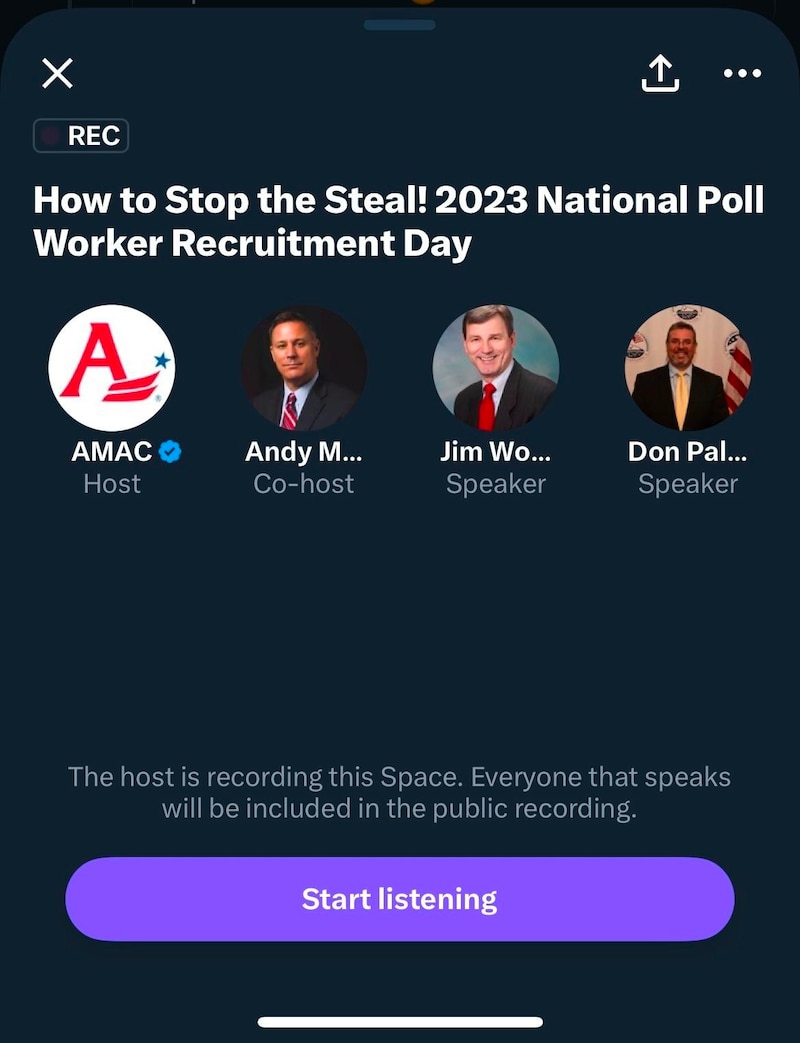
It took three separate emails and two days of prompting to get a sort-of straight answer:
“The EAC Commissioners believe that U.S. elections are secure and fair.”
Oh.
It’s not great that most Republican candidates and some sitting officials don’t have straightforward answers to straightforward questions about a nearly three-year-old event. And now that 2024 is staring us straight in the face, it’s even more unnerving to hear mealymouthed answers about the previous presidential election.
Pence was right when he characterized his actions on Jan. 6 as a decisive moment of leadership that those seeking similar positions of power should articulate a stance on. He is one of the few willing to do such a thing.
And that matters, because post-2020 America has a completely new type of political crisis — an election crisis — that could emerge to test a president. Remember the famous Hillary Clinton ad about the 3 a.m. phone call, and who would be prepared to answer it? Right now, it’s hard to tell.
Back Then
This week’s history lesson is more of a PSA: 50,000 women in Boston registered in 1920 after the 19th Amendment was ratified, and now we can meet them. Reports WBUR: “Evidence of that historic moment 103 years ago have long been available in the form of 160 volumes of voter registration records in the city’s archives. Now, a team of archivists and transcribers are digitizing them and making the records searchable as part of the Mary Eliza Project: Boston Women Voters in 1920.” The project is named for Mary Eliza Mahona, considered to be the first formally trained Black nurse in the United States and one of the first women who registered in the city, at the age of 76.
New From Votebeat
From Votebeat Arizona: Arizona pilot for secure ballot paper won’t move forward as planned
From Votebeat Michigan: People leaving prisons in Michigan would get information on how to register to vote under proposed bill
In Other Voting News
- The Texas Supreme Court declined to block a new state law eliminating Harris County’s election administrator position, which requires election oversight to be transferred to the county clerk and tax assessor on Sept. 1, shortly before voting starts in this November’s election, the Texas Tribune reported. Experts have warned the new law, which applies solely to the state’s most populous county, could cause problems for voters this year and in 2024.
- Local and state election officials joined the U.S. Cybersecurity and Infrastructure Security Agency, or CISA, for the country’s largest election security exercise earlier this month, a three-day gathering aimed at preparing for hypothetical scenarios that could affect elections. But a proposal from the conservative Heritage Foundation, aimed at the next Republican administration, would end the agency’s efforts to fight mis- and disinformation and potentially reorganize the agency so it no longer falls under the Department of Homeland Security, ABC News reported.
- A federal judge temporarily blocked provisions in a Georgia voting law imposing criminal penalties on those who give food, drinks or gifts to within 25 feet of any voter standing in line from a polling place, no matter how far the voter is from the polling place, and requiring the rejection of absentee ballots if the voter does not write their date of birth on the outer envelope. The judge declined to block other provisions of the law, the Atlanta Journal-Constitution reported, and the litigation is still underway.
- New documents obtained by VPM News show Virginia Gov. Glenn Youngkin’s office may have been involved in the state’s decision to abruptly pull out of ERIC, the multistate compact dedicated to cleaning voting rolls, and show more details about Virginia’s ongoing talks with other states to replace it.
- North Carolina county election boards will offer free identification to voters who need it to comply with new requirements to vote this year, and the state’s Democratic governor vetoed a Republican-backed overhaul of the state’s voting laws that passed along party lines, though a supermajority of Republican lawmakers could override his veto.
- On Oct. 14, Louisiana voters will be the first in the nation to vote on a constitutional amendment that would forbid the use of private or foreign money for election costs, Bolts reports. Dozens of other states have already banned the practice through legislation.
- A Democratic nominee to New York City’s Board of Elections starred in the (sadly cancelled) reality show “Staten Island Law.”
Jessica Huseman is Votebeat’s editorial director and is based in Dallas. Contact Jessica at jhuseman@votebeat.org.

